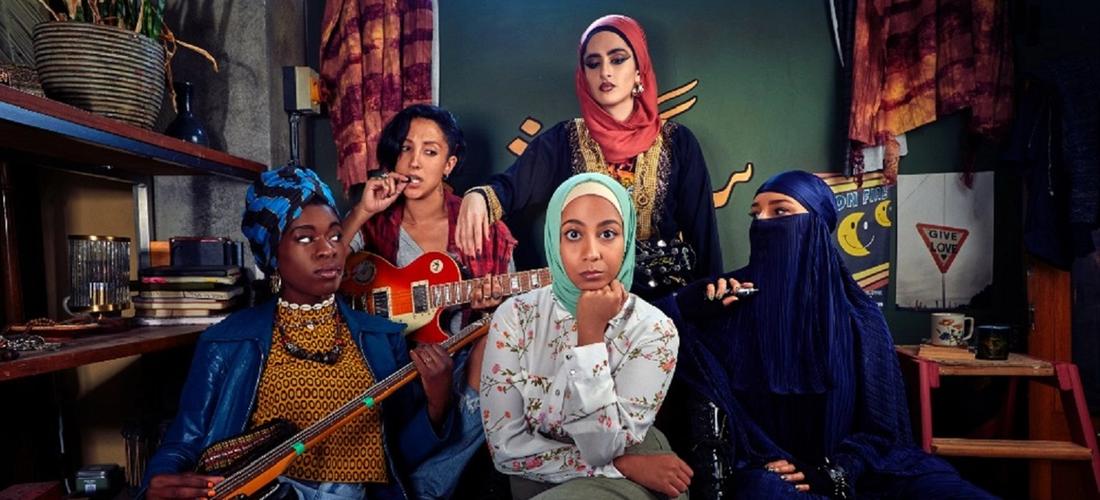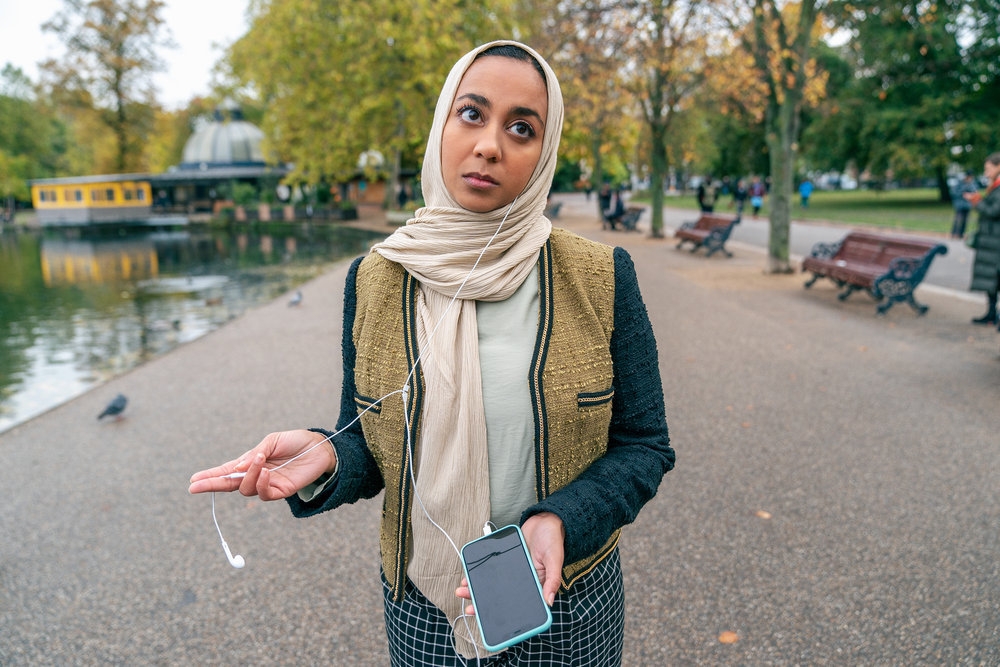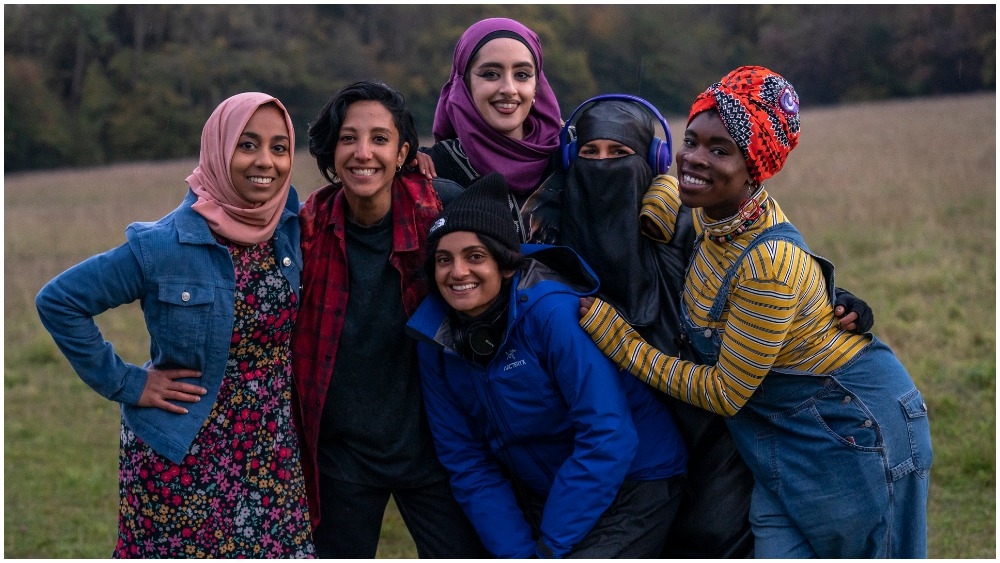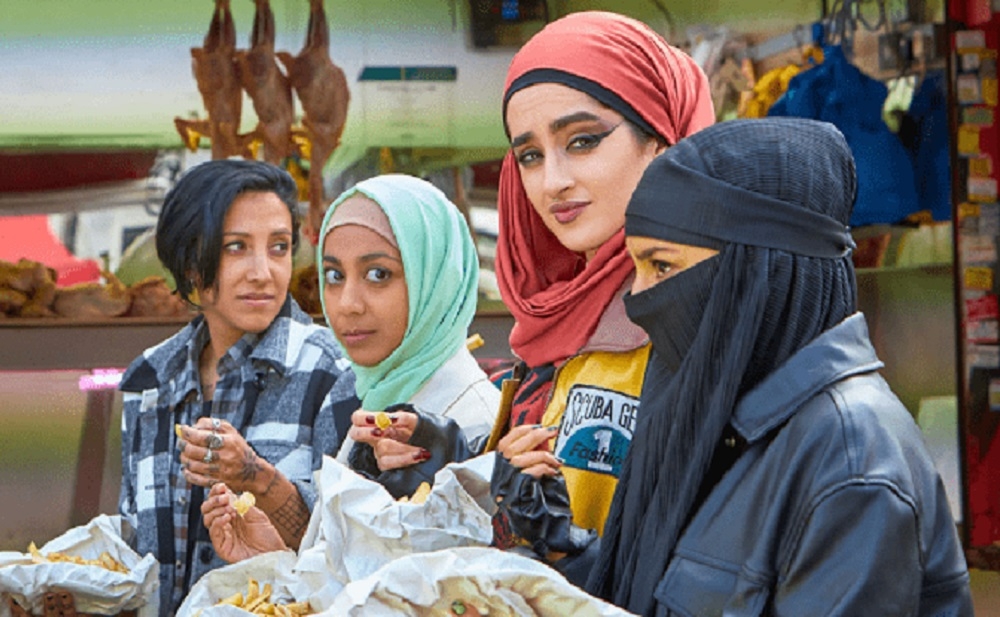This Goes Way Beyond Representation – A Review of 'We Are Lady Parts'
Lifestyle
|
Jul 6, 2021
|
8 MIN READ

The ladies of "We Are Lady Parts" Image source: NBCUniversal
By Hind Makki
Review: We Are Lady Parts, Peacock TV-MA
I first heard about British director Nida Manzoor’s new series, We Are Lady Parts (WALP) after someone complained about it in one of my WhatsApp groups. The complainer thought the series about an all-female Muslim punk band taught all the wrong values to impressionable young Muslim women. His criticism piqued my interest.
But it was only after I saw a laugh-out-loud short clip, in which new band member Amina takes issue with their original song, “Voldemort Under My Headscarf,” [explicit lyrics] that I immediately binged all six episodes available in the U.S. on Peacock (a channel that is part of NBCUniversal Streaming Service). The show stole my heart. It is subversive. It is loud. It is poignant. It is angry. It is uplifting.
It is like nothing I have seen before. And it is very, very funny.
The opening scene of WALP does start like a well-worn romantic comedy trope: Amina Hussain, 26, a Capricorn, who is finishing a PhD in microbiology, is sitting between her parents meeting a stern potential rishta (marriage match) and his humorless parents. But through a running monologue, which continues throughout the series, we are treated to Amina’s fanciful imagination and her reactions to her loving and supportive parents, who are nonetheless prone to blurting out unfiltered thoughts.
For example, they tell the humorless rishta that their daughter loves playing guitar but has such debilitating stage fright, she’s prone to expelling bodily fluids if she performs in public. Amina, for her part, is pressuring herself to get married, as all her friends are partnered up, and she wants to fit in.
This is all very well and good thus far, but then the show gets very, very interesting. Before we go further, let’s address the elephant in the room. Yes, many Muslims might not like this show, these characters, these storylines. Yes, it's about an all-women punk band, so you can imagine the faith-based debates that start there.

Amina of We Are Lady Parts, played by Anjana Vasan; image source: NBCUniversal.
WALP, whose TV-MA rating is based on language (and some Muslim viewers may be uncomfortable with its portrayal of drug use and both straight and queer premarital relationships) is unapologetic about allowing its five female Muslim protagonists to fully occupy each facet of their identities. I might also add that I’ve been watching Turkish television series almost exclusively since 2019. WALP is actually the first Western television series I’ve seen in years.
The reason I watch Turkish series and the reason I liked this show are actually related: WALP does not perform for the White Gaze. It refuses to deploy its Muslim women to fulfill Western tropes that the Jack Shaheen, the late expert on ethnic and racial stereotypes in Hollywood, writes of: billionaires, bombers, and belly dancers. Instead, WALP inverts these tropes and shows us diverse, nuanced and authentic Muslim characters.
“This is Us, By Us, For Us.”
While at first glance the Lady Parts women seem to be too punk to be real, the layers are peeled back to reveal authentic Muslim women creating their own space, refusing to be defined by Islamophobia or the patriarchy - whether from within Muslim communities or in broader British society. They navigate relationships with their families and partners, pursue their dreams and support each other as sisters. If you mute the electric guitar, most of us will recognize these women from our own lives. But why would you want to lower the volume?
The women of Lady Parts might be “sisters who pray together, play together, speaking our truth to whoever can be arsed to listen,” but they are still punk rockers!
The series begins with Amina searching for love and a life partner in order to fit in with her university friends. Only after joining the band does she learn to be comfortable with all parts of her identity: scientist, daughter, friend and punk rocker. Among her bandmates, Amina seems the most straight-laced; she wears pastel-colored hijabs and minimal makeup. We are introduced to the band through Amina’s eyes; she tells us “I’d never met girls like this before.”

The cast of We Are Lady Parts with show creator Nida Manzoor in the center; image source NBCUniversal.
Vocalist Saira, the founder of the band, is its heart. Her short hair, ripped jeans and plain t-shirts belie a wounded soul inspired by the poetry of her South Asian heritage. Estranged from her family and with severe trust issues, the band is her everything. Bisma, the bassist and emotional glue of the band, rocks bright West African turbans and political t-shirts. Ayesha, the drummer and Uber driver with road rage, often pairs sparkly Middle Eastern abayas and drapey headscarves with dramatic eyeliner. And Momtaz, the band manager with a steely determination to make the band a success, is the niqabi daughter of an Irish convert.
Throughout the six episodes, the viewer is treated to glimpses of Muslim life that are very genuine. Bisma and her husband parent a precocious and intelligent daughter while gently dealing with their friends’ romantic woes, surviving mind-numbing day jobs, and pursuing artistic dreams at night. They remind me of half a dozen couples I know through IMAN’s Community Cafes in Chicago over the years.
And, there might be a little bit of Noor, Amina’s best friend and self-centered "perfect" Muslimah who has both a fiance and a shaykha, in each of us. Thankfully, Noor finally learns there is such a thing as self-awareness and begins to accept her friends for who they are. Many of these details are so genuine, so real to life, that the series could only have been written in this way by a Muslim woman.
Of course, WALP is a TV show and not a documentary; there are aspects that do seem made-for-TV, such as Amina’s taboo-flouting oversharing mom, or Saira the filthy-mouthed halal butcher. Her trust issues prevent her from committing long term to her absolute darling of a boyfriend, Abdullah, who wants to make their relationship as halal as the meat she butchers.
The diverse characters are so naturally presented that the average viewer may not even notice. Each band member identifies as an observant Muslim - Lady Parts formed after Saira and Ayesha met at a mosque - even if their clothing choices, romantic relationships, and punkness confuses people who prefer neat labels. The band is hyperaware of the stereotypes about Muslim women, but they don’t live their lives to fit into someone else’s box. Their raison d’etre isn’t to break stereotypes.
When Saira tells a vlogger that “our music is about representation. It’s about being heard,” she isn’t claiming to represent 1.7 billion Muslims. They are only representing themselves. And in telling a story unique to five Muslim women in London, WALP tells a universal truth: everybody wants to be heard; everybody should be allowed to be comfortable in their own skin.

Image source: NBCUnviersal
“One Part Boredom, Two Parts Identity Crisis”
As visibly Muslim women navigating life, love, careers, and family the pitfalls of misrepresentation for the band are everywhere. They refuse to let others put words in their mouths. In order to be heard, they have to be loud. And as punk rockers, they like being loud. But first Amina must find her voice. In a pivotal scene, Saira recites from Pakistani poet Faiz Ahmed Faiz’s revolutionary poem Speak and helps Amina begin to dismantle her insecurities and self-doubt.
“Speak, for your lips are yet free; Speak, for your tongue is still your own; Your body yours alone; Speak, your life is still your own.”
The series - whose very funny dialogue I am unable to give full due - is almost self-deprecating in its self awareness about what W.E.B. Du Bois, the 20th century African American sociologist and civil rights activist, termed double-consciousness. During a very awkward first date, Amina nervously asks “so where are you from?” Her date’s response, “Where am I from? That’s a big question, you know. Where am I from? Or where am I FROM, from?” indicates a weariness with a question that children of immigrants often face. Amina does end that line of questioning almost immediately, but manages to daydream about the dreamy-ness of West London boys, sons of Iraqi immigrants or otherwise.
The band members are so comfortable in their own skin; they seamlessly move from performing rock anthems, like Queen’s “We Are the Champions,” to writing original songs referencing the pop culture they were raised in, like the Harry Potter series. In “Ain’t No One Gonna Honour Kill My Sister But Me” [explicit lyrics], they mock stereotype of the oppressed Muslim woman, because the fight is over a stolen eyeliner. And in “Bashir With the Good Beard,” the [explicit] lyrics take on the unreasonable expectations that some in the Muslim community have of women.
There is no didactic purpose to break stereotypes or manufacture safe Muslim characters palatable to the non-Muslim gaze and respectful of the whims of every potential Muslim viewer. It feels like We Are Lady Parts’ main audience are Amina, Saira, Ayesha, Bisma, Momtaz, and anyone who identifies with them or cares about their happiness. And, by breaking free of both the constraints of the White Gaze and Haram Police, WALP becomes something refreshing and cutting-edge. If not for everyone.*
The show will absolutely not please everyone because it does not aim to please. It does not aim to educate non-Muslims about Islam. It’s not broadly representative; I didn’t see obvious representations of Muslims with disabilities. I don’t think the series is perfect, but it doesn’t aim to be perfect. It aims to entertain. It is loud, vulgar and disquieting. It is like nothing I’ve seen before. And if you’re interested in a funny series with a great soundtrack that authentically portrays five misfit Muslim women, it should be your next binge-watch.
*I don't recommend children watch this. There is frequent swearing, drug use, and portrayals of premarital relationships.
Hind Makki is an interfaith and anti-racism educator who holds a degree in International Relations from Brown University. She is an Educator with the Institute for Social Policy and Understanding (ISPU) and is the founder and curator of Side Entrance, an award-winning website documenting women’s prayer experiences in mosques around the world. In 2018, Hind was recognized as one of CNN’s 25 Influential American Muslims. She has served on the Islamic Society of North America’s Mosque Inclusion Taskforce and is a former Fellow of the American Muslim Civic Leadership Institute. Hind is an advisor to the ISPU project Reimagining Muslim Spaces, and offers consultations, workshops on mosque inclusion in Western Europe and the United States.
Subscribe to be the first to know about new product releases, styling ideas and more.
What products are you interested in?

